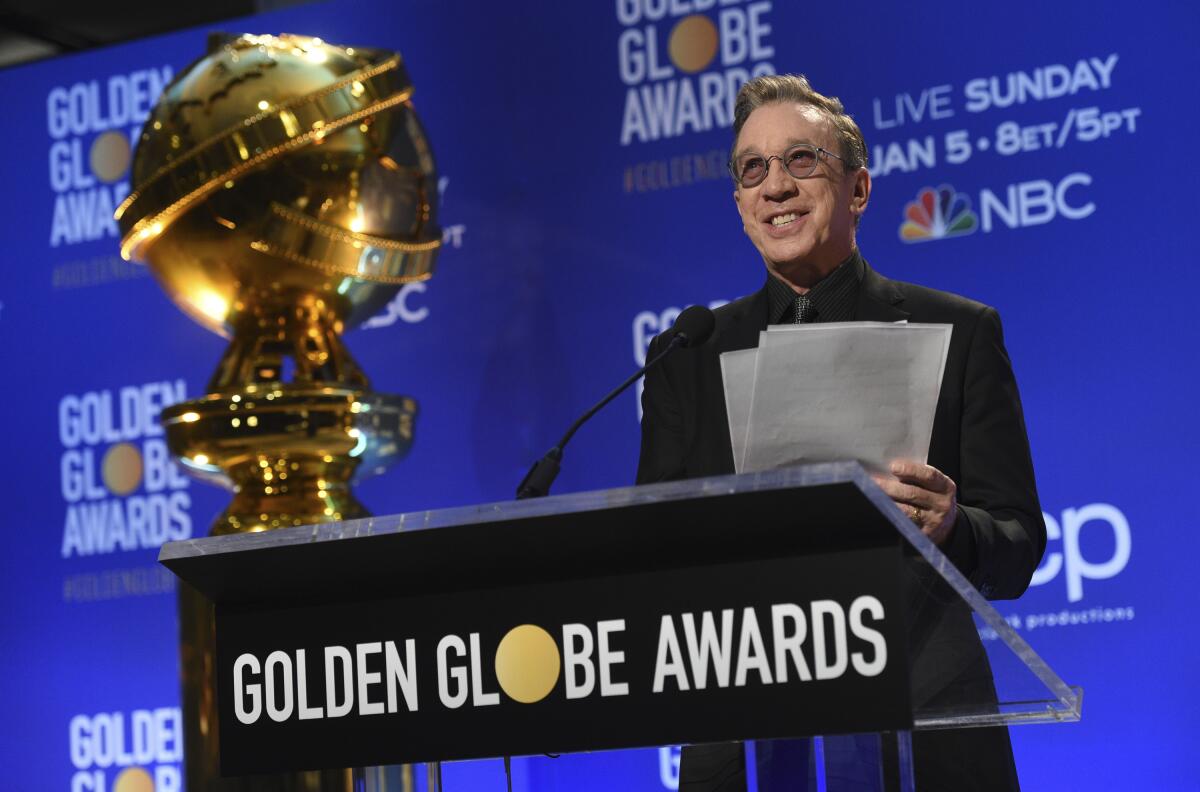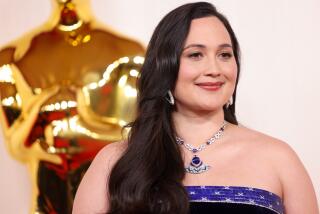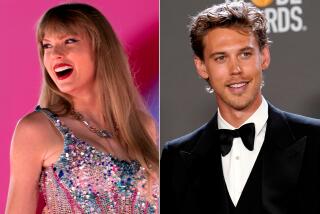Struggling to rebound from controversy, Golden Globes group adds 21 new members

After weathering months of blistering criticism, the Hollywood Foreign Press Assn., the group that hands out the Golden Globe Awards, announced Friday that it is adding 21 members to its ranks, including six who are Black â a significant milestone for the embattled organization as it fights to rescue its awards show from potential extinction.
While the HFPA has long included members from countries around the world, it had not had a single Black member for more than two decades. After that fact was highlighted in a Feb. 21 Times investigation, the organization â which has long wielded an outsized influence as the arbiter of one of the entertainment industryâs most coveted, if mocked, awards â was plunged into an existential public relations crisis from which it is still struggling to recover.
Spurned by the stars who had once courted its favor and beset from all sides by criticism, for the HFPA the addition of new members â and in particular Black members â had become essentially a matter of life and death. In March, the organization publicly committed to adding at least 13 Black members, mirroring the roughly 13% Black population in the United States â a pledge that smacked of tokenism to some in Hollywood.
The HFPA has come under pressure for not having any Black members as well as allegations of ethical and financial lapses raised in a Times investigation.
The HFPAâs new class of journalists is by far the largest the organization has ever accepted, expanding the organizationâs ranks by more than 20% and pushing its total membership to 105.
In May, after months of criticism over the HFPAâs lack of Black members â along with a range of other issues involving the groupâs journalistic ethics, self-dealing and governance highlighted in The Timesâ investigation â NBC announced that it would not air the Globes in 2022. The move marked a stunning reversal of fortune for a historically highly rated precursor to the Oscars that had long been billed as âHollywoodâs party of the year.â
Even as a coalition of leading entertainment publicists has continued to bar the HFPA from all-important access to Hollywood talent and the major studios have warily kept their distance, the groupâs leadership has pushed ahead with its effort to deliver the âtransformational changeâ it promised in early March.
According to the HFPA, of the 21 newly accepted journalists, 10 of whom are women, five identify as Asian, six as Latinx and four as Middle Eastern or North African. The group says it expects to bring in a similar sized group in 2022.
âWe are thrilled to welcome these new members into our family,â said HFPA President Helen Hoehne, who was elected to lead the group in September, in a statement. âWe are building a new organization, one that is not focused on fulfilling quotas, but instead has diversity and inclusion at its core, has ethical conduct as the norm, and has people of color involved in every aspect of the Association â from membership to executive leadership.
âThat is how weâre growing an inclusive environment, and for us to make this much progress in six months is a testament to our membership and our dedication to building something better.â
The HFPA released the names and journalistic affiliations of the 21 new members, who contribute to El Pais, ESPN and Al Arabiya, as well as other outlets. But despite promising to do so earlier this year, the traditionally secretive organization has not yet published similar information about its existing members on its website.
The HFPAâs announcement of its new members follows on the heels of a series of other steps toward reform, including adopting a new set of bylaws and expanding its board of directors to include three nonmembers, as the group struggles to get back in the good graces of Hollywood.
A Times investigation finds that the nonprofit HFPA regularly issues substantial payments to its members in ways that some experts say could skirt IRS guidelines.
But instituting reform has often been messy and marked by internal dissent and conflict. In April, the groupâs newly hired diversity consultant quit just days after an email leaked in which former eight-term HFPA president Phil Berk likened Black Lives Matter to a hate group. (Berk stepped down after NBC and Dick Clark Productions demanded his ouster.) In June, two members quit the organization, calling the HFPA âtoxicâ and dismissing its reform efforts as âwindow-dressing.â
The HFPA has long drawn criticism for purportedly exclusionary practices. In August 2020, Norwegian journalist Kjersti Flaa filed a lawsuit against the HFPA, claiming the tax-exempt organization operated as a kind of cartel, barring qualified applicants â including herself â and monopolizing all-important press access while improperly subsidizing its membersâ income. The lawsuit was dismissed in March but Flaa, joined by Spanish journalist Rosa Gamazo, has filed an appeal.
To help recruit new members, the HFPA consulted with outside journalism groups including the National Assn. of Black Journalists and created a nine-person credentials committee that includes five nonmembers with backgrounds in journalism to oversee the admissions process.
To expand the pool of potential applicants, a longstanding rule requiring residency in Southern California was eliminated, as was a requirement of sponsorship by existing members.
As the HFPA has struggled to prove its credibility, some in the industry have suggested that it should eventually expand its membership to roughly 300 â a number that may be difficult, if not impossible, to achieve.
Faced with its own inclusion controversy in the wake of #OscarsSoWhite, the motion picture academy dramatically expanded its membership, doubling the number of women and people of color in four years and expanding its ranks by more than 60%. But while the number of potential academy members around the world is vast, the pool of journalists covering entertainment full-time for foreign outlets, never very large to begin with, has only been shrinking.
It remains to be seen how the industry will respond to the HFPAâs continued reform efforts. While some within the organization believe that the Globes could still be resurrected for 2022, many outside the group â which has weathered numerous embarrassing scandals and long been the butt of jokes even from the stage of its own awards show â remain skeptical that it is truly committed to change.
The HFPA, which is expected to announce its first-ever CEO in the coming weeks, says it will continue to expand its outreach to potential applicants as it strives to build a more inclusive and respected organization.
âAs a committee, weâre proud of this first class weâve invited to join the reimagined HFPA. Theyâre a group of well-respected journalists from around the world who will bring a variety of unique perspectives to this organization,â credential committee member Treâvell Anderson, a former staff writer at The Times, said in a statement. âThat said, we recognize that this is just a first step in a long process, and as a committee, weâre excited to build upon our work in the weeks, months and years to come to continue creating a more inclusive and supportive collective.â
A Times investigation finds that the nonprofit HFPA regularly issues substantial payments to its members in ways that some experts say could skirt IRS guidelines.
A list of the new HFPA members:
⢠Raffi Boghosian, Al Arabiya
⢠Kelley Carter, ESPN (Global)
⢠David Caspi, Israel Hayom
⢠Yong Chavez, ABS-CBN
⢠AndrÊs Correa Guatarasma, El Universal
⢠Earl Gibson III, Getty Images
⢠Eun Seon Ha, KOFIC
⢠Hamdy Howaida, Al Akhbar
⢠Itsuko Hirai, Movie Walker Press
⢠K.J. Matthews, DW-TV
⢠Juan Navarro, Televisa
⢠Jânio Carlos Vieira Nazareth, CinÊpop
⢠Ruben Peralta-Rigaud, SensaCine
⢠Gerardo Prat, ¥HOLA! TV
⢠Kimberly Reyes, Film Ireland
⢠Mico Saad, TeN TV
⢠Asel Sherniyazova, AKIpress News Agency
⢠Gabriel Silva Lamboglia, El PaĂs
⢠Miriam Spritzer, LâOfficiel Brasil
⢠Mario Pacheco SzÊkely, El Universal
⢠Yuko Yoshikawa, Cinema Today
Times staff writer Stacy Perman contributed to this report.
More to Read
Only good movies
Get the Indie Focus newsletter, Mark Olsen's weekly guide to the world of cinema.
You may occasionally receive promotional content from the Los Angeles Times.












